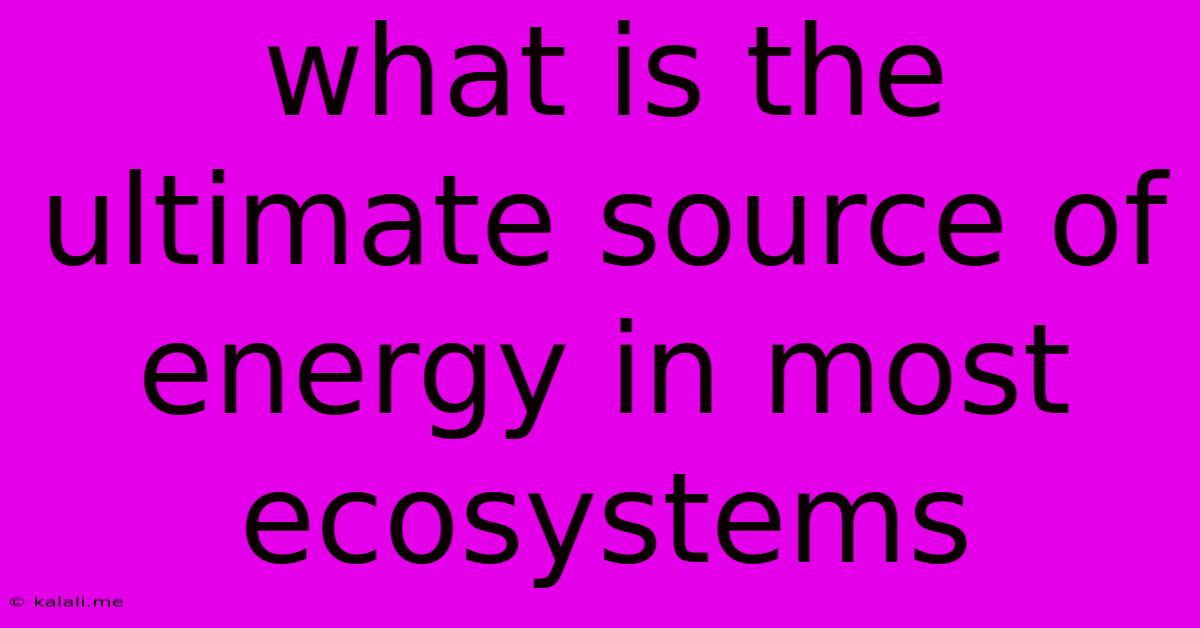What Is The Ultimate Source Of Energy In Most Ecosystems
Kalali
May 10, 2025 · 3 min read

Table of Contents
What is the Ultimate Source of Energy in Most Ecosystems?
The sun. That's the simple answer, but understanding why the sun is the ultimate source of energy in most ecosystems requires delving into the intricate processes that sustain life on Earth. This article will explore the sun's crucial role, highlighting the flow of energy from its radiant power to the complex web of life it supports.
The Sun: The Engine of Life
Almost all life on Earth depends directly or indirectly on solar energy. This energy is the driving force behind the vast majority of ecosystems, fueling everything from the smallest bacteria to the largest whales. But how does this solar energy get transferred and used?
Photosynthesis: The Foundation of the Food Web
The primary way solar energy enters most ecosystems is through photosynthesis. This remarkable process is carried out by photosynthetic organisms, primarily plants and algae, but also certain bacteria. These organisms utilize sunlight, water, and carbon dioxide to produce glucose (a sugar), which serves as their primary energy source. Crucially, this process also releases oxygen, a byproduct essential for the respiration of most organisms.
- Chlorophyll: The key to photosynthesis is chlorophyll, a pigment that absorbs light energy from the sun. This absorbed energy drives the chemical reactions that convert carbon dioxide and water into glucose and oxygen.
- Producers: Photosynthetic organisms are known as producers because they produce their own food using solar energy. They form the base of most food webs.
Energy Transfer Through the Food Web
The energy stored in the glucose produced during photosynthesis doesn't just stay within the producer. It flows through the ecosystem via a complex food web.
- Consumers: Herbivores (primary consumers) eat plants, obtaining the energy stored within their tissues. Carnivores (secondary and tertiary consumers) then consume herbivores, gaining energy from their prey. Decomposers (bacteria and fungi) break down dead organisms, returning nutrients to the soil and completing the cycle.
- Energy Loss: It's important to remember that energy is lost at each step in the food chain. Only a fraction of the energy consumed by an organism is converted into its own biomass; the rest is lost as heat. This explains why food chains rarely have more than four or five trophic levels.
Exceptions to the Rule: Chemosynthesis
While the sun is the ultimate energy source for most ecosystems, there are exceptions. Deep-sea hydrothermal vents, for example, support unique ecosystems based on chemosynthesis. In these environments, organisms use chemicals, such as hydrogen sulfide, instead of sunlight to produce energy. However, even these ecosystems are indirectly linked to the sun's energy, as the geological processes that create hydrothermal vents are ultimately powered by the Earth's internal heat, a residual heat from the planet's formation billions of years ago, influenced by solar radiation and planetary formation.
Conclusion:
In summary, while some specialized ecosystems rely on chemosynthesis, the sun remains the ultimate source of energy for the vast majority of life on Earth. Its radiant energy drives photosynthesis, the foundation of most food webs and the engine that powers the incredible biodiversity of our planet. Understanding this fundamental energy flow is crucial for comprehending the intricate balance and interconnectedness of life on Earth.
Latest Posts
Latest Posts
-
How Many Times Does 3 Go Into 30
Jul 13, 2025
-
In What Episode Of Bleach Does Ichigo Ask Orihime Out
Jul 13, 2025
-
How Much Is 4 Oz Chocolate Chips
Jul 13, 2025
-
How Many Times Does 9 Go Into 70
Jul 13, 2025
-
4 Pics 1 Word Cheat 8 Letters
Jul 13, 2025
Related Post
Thank you for visiting our website which covers about What Is The Ultimate Source Of Energy In Most Ecosystems . We hope the information provided has been useful to you. Feel free to contact us if you have any questions or need further assistance. See you next time and don't miss to bookmark.